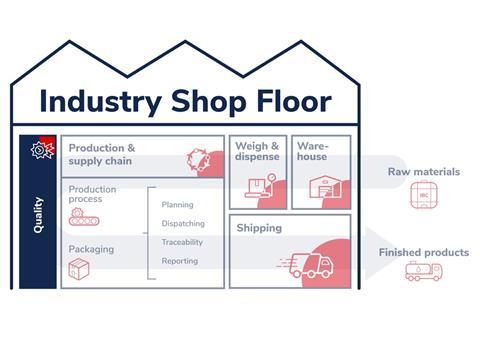
In a series of 5 Innovation Spotlight articles, AG Solution goes beyond the buzzwords and explains how a digitalization journey can be a means to dealing with very practical problems and challenges in your specific environment. In this edition, we focus on quality.
MES is all about managing and orchestrating all manufacturing activities ensuring product quality. But this can only be realized when the quality department has a complete overview of all quality-related data, and the right tools to communicate swiftly and efficiently with the product department when needed. This requires a well-integrated MES system that connects with all relevant data sources.
Quality is a crucial department in any industry, and they are involved in process definition and all quality control procedures. The quality control department ensures that the product meets the agreed specifications (PH, viscosity, etc.) during the production process. The quality assurance department needs to ensure that the finalized product reaches the customer as agreed and follows the customer’s quality specifications. This includes collecting documents, reviewing the overall product quality, and signing it off for shipping. In short, the quality department oversees the product quality from the very first customer order up to the final delivery.
To ensure product quality, the manufacturing processes need the right amount of quality controls, and well-functioning procedures when the quality is found to be lacking. But without an integrated system that links the manufacturing with the quality department, it is very hard or even impossible to optimize the processes with built-in quality controls and efficient handling of deviations. There will always be an abundance of phone calls and redundant communication whenever a deviation occurs. And even when all goes well, the manual and non-integrated quality procedures entail a great deal of non-value-added work.
All this leads to a slow and inefficient product release cycle, which is far more costly than it should be. The quality department lacks real-time visibility of the process and proactive systems to alert about process deviations. Furthermore, when deviations occur, it is very difficult to find root causes for the problem, due to the absence of a system that integrates and connects all types of data.
MES: ensuring the quality of the quality department
A fully-equipped MES interfaces with quality systems and resources and integrates with the production environment in order to ease the communication between production and quality departments, which results into an optimized production. It allows for better management of sampling, in order to optimize the quality processes within the production cycle.
This system is naturally capable of interfacing with all different manufacturing IT Systems, and can thus provide an aggregated complete view of all processes. It should provide visibility of the processes in real-time, with the possibility to alert the Quality department proactively whenever there is a process deviation. And it helps avoid mistakes by blocking the shipping of products with deviations.
In terms of features, a well-equipped MES should provide:
- Complete Quality Control Plan management
- Event-based quality actions execution (sampling)
- Periodic generation of Quality Controls
- Quality procedures in production workflows
- Quality traceability and Corrective Action Preventative Action (CAPA)

Benefits: improved product quality, cost-efficiency and a thriving Quality department
When all of the above functionality is introduced, the Quality Department will perform significantly better because of the automation of processes and the proactive quality deviation alerts. It will also contribute to an organizational efficiency in various ways.
Processes will be optimized by data retrieval and root-cause analysis whenever a deviation has occurred. The early detection of deviations will lead to a reduction of scrap, rework, and ultimately of the release time as well.
Overall, the MES will benefit the product quality as well, because such system will ensure all procedures have been followed. Additionally, it will collect, combine, and report all manufacturing data, which enables better control and management of all quality-related items.
This centralization, integration, and easy access to data also leads to a dramatic reduction of paper needed for regulated environments, and regulatory audits will be far less complex because all relevant information is at your fingertips.
To summarize, MES Quality leads to an improved product quality, a better functioning quality department, and ultimately lifts the entire organization to a higher level by reducing costs while increasing customer satisfaction.
MES Quality is the fourth article in a 5-article series illustrating how MES can contribute to your digitalization strategy. In our next article, we will focus on Reporting.
Can’t wait to optimize your quality assurance & control processes? Contact us today and our experts will help you get started.
This content was sponsored by AG Solution.
















